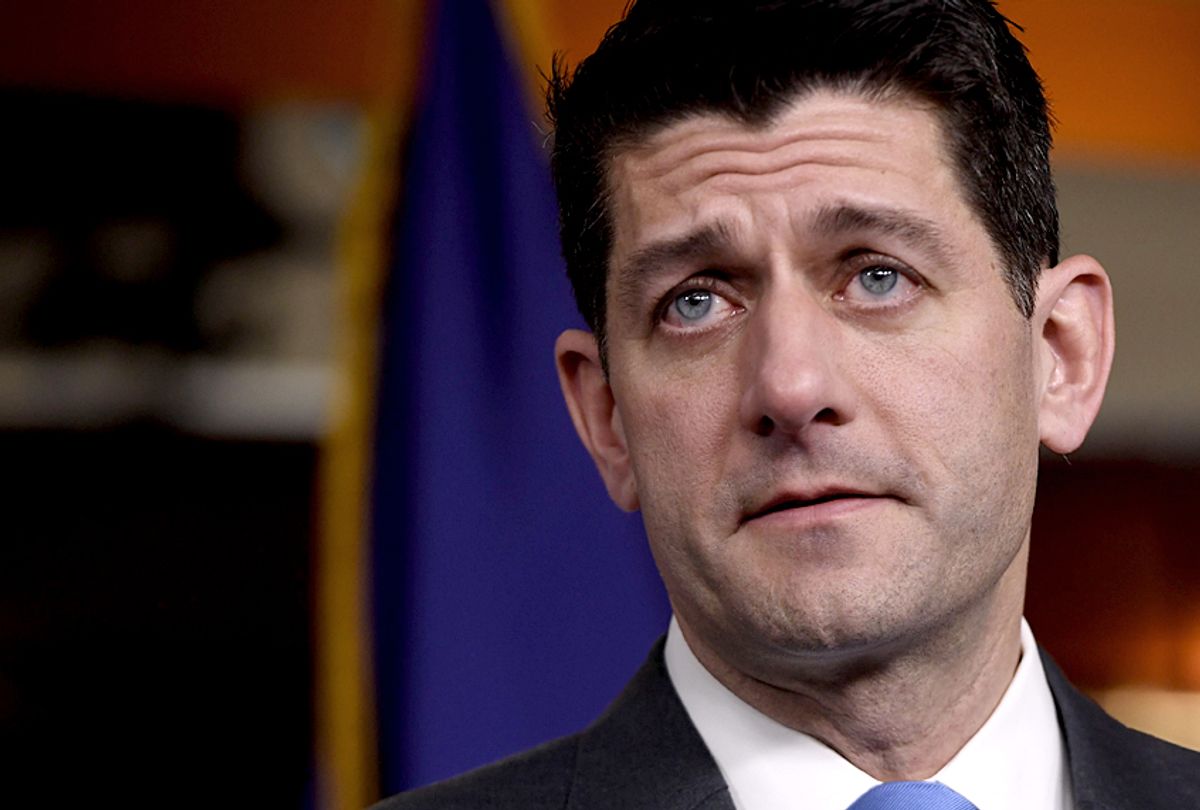With the announcement that he will be leaving Congress in 2019, Speaker of the House Paul Ryan has guaranteed that his congressional legacy will be that of a cautionary tale — namely, of a once fiercely autonomous and independent-minded legislator who sold his soul in order to appease a corrupt politician, President Donald Trump. And he will be leaving behind a party at a crossroads, on the verge of a very important election.
"This will be interpreted as almost a concession that the Republicans will lose the House," Larry Sabato, founder and director of the Center for Politics, told Salon. "And ask yourself what you would do if you were a vulnerable Republican seeking reelection in the House. Might you not consider not running for reelection? Of course you would! Now most of them will run anyway, but some of them will retire. This is the little additional kick they need to go out the door. And it's bound to demoralize some of the House Republicans."
It will be a loss, no matter how Ryan spins it.
"Well, we haven't heard him say anything, and I'm sure when he gets his opportunity he will declare this to be a victory lap and claim that it has no effect at all on the November elections and there are so many good people to replace him and Republicans will hold the majority. And of course that's all poppycock," Sabato said.
"We know the speakers have served a fairly lengthy period," Sabato said. "Now occasionally when you had a change of House majority control, a speaker went out but then came back in, as [Republican Joe] Martin and [Democrat Sam] Rayburn did. But no, this is highly unusual. It's a degree of instability that the House has not seen in modern times."
And Ryan will be leaving behind a fractured Republican Party.
"The Republican caucus in the House is badly split," Sabato said. "Depending on how you count the factions — you can go to four or five — generally speaking it's the Freedom Caucus versus more mainstream conservatives versus the tiny handful of remaining moderates. So it's not pleasant to be speaker, certainly not like the old days, and then you have the Trump factor in. That's got to be a nightmare for any speaker of the House."
While it's tempting to pin all of the blame for Ryan's decision to leave on Trump, Sabato drew attention to the fact that the previous Speaker of the House, Republican John Boehner, retired less than three years ago because of his own headaches dealing with the current GOP.
And Ryan leaves behind a legacy that was quickly tarnished.
"Ryan was once seen as the cutting edge of the new, younger, energetic conservative wing of the Republican Party," Sabato said. "And I'm sure he's very proud of that tax bill. That will be what he cites today and forever. And of course with a certain segment of America, that will resonate — that is the wealthier segment, the corporate segment, the people who will be employing Ryan at lavish salaries. But my feeling is that Ryan, who was once respected for being principled, has in fact turned into one of Donald Trump's prime enablers. And that's how he will be remembered."
Although it's unclear whether Trump himself feels this way, he certainly had a glowing appraisal for Ryan on Twitter when the retirement was announced.
It is likely that the two top contenders to replace Ryan as Speaker of the House are House Majority Leader Kevin McCarthy, R-Calif, and Rep. Steve Scalise, R-La., according to Axios. Because Scalise has said that he won't seek the job if McCarthy wants it, McCarthy will likely emerge as the frontrunner if he announces that he wants the job.
Democrats, meanwhile, are hoping that Ryan may take advantage of the fact that he no longer has to seek reelection to work with their party on important issues.
"With his newfound political freedom, I hope the Speaker uses his remaining time in Congress to break free from the hard-right factions of his caucus that have kept Congress from getting real things done. If he’s willing to reach across the aisle, he’ll find Democrats willing and eager to work with him," Senate Minority Leader Chuck Schumer told The New York Times.



Shares